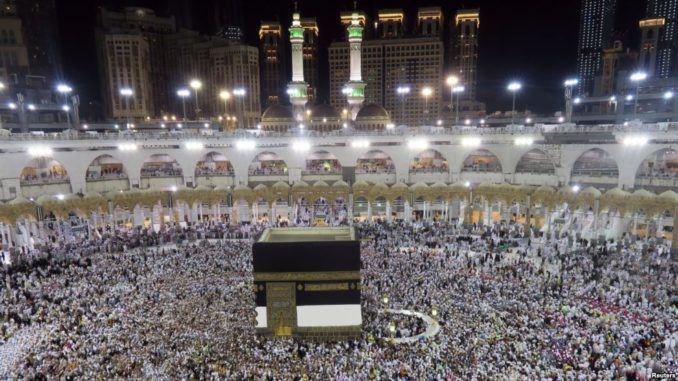
More than 1.5 million Muslims from across the globe have converged on Saudi Arabia for the annual five-day Hajj. The pilgrimage is one of the five pillars of Islam, and all able-bodied Muslims who can afford to do so are expected to take part in the Hajj at least once in their lifetimes.
Iran is boycotting this year’s Hajj, in part over security concerns; during last year’s pilgrimage, several hundred Iranians were among at least 2,000 who were crushed to death in a stampede in the city of Mina. Iran cited Saudi “incompetence” and a poor response by health and safety officials.
What are guarantees #Minastampede won’t be repeated in similar situations? World of Islam must not let Saudi rulers escape responsibility.
— Khamenei.ir (@khamenei_ir) September 7, 2016
This isn’t the first time Iran has boycotted the Hajj, but it comes at a time when tensions with rival Saudi Arabia are at a record high over conflicts in Syria and Yemen, where Tehran and Riyadh support opposite sides.
Saudi Arabia cut ties with Iran last January after demonstrators set fire to the Saudi Embassy in Tehran following Riyadh’s execution of a prominent Shi’ite cleric, Sheikh Nimr al-Nimr.
Saudi Arabia's top cleric Abdulaziz al-Sheikh says Iranians are "not Muslims" https://t.co/Ly3KDj5EbE
— The Daily Star (@dailystarnews) September 6, 2016
In recent weeks, rhetoric between the capitals has escalated. Iran’s supreme leader, Ayatollah Ali Khamenei, has challenged Saudi Arabia’s right to manage Islam’s holy sites, accusing the Saudi royal family of “murder” in last year’s stampede. A prominent Saudi cleric responded by saying Iran’s leaders are “not Muslim.”
Safety concerns
Saudi Arabia has doubled down on safety and security in a bid to avoid a repeat of last year’s disaster. The publication Arab News reports that authorities have conducted 1,000 health and safety training courses in recent weeks and deployed 26,000 medical, technical and other official personnel to pilgrimage areas in Mecca, Medina, Arafat and Mina, along with a fleet of more than 175 ambulances. Security officials have placed 1,000 cameras at strategic locations to allow constant monitoring of events.
Members of Saudi security forces take part in a military parade in preparation for the annual Haj pilgrimage in the holy city of Mecca September 5, 2016
All pilgrims are being outfitted with wearable water-resistant e-bracelets, equipped with barcodes that link to personal information such as medical records, in an effort to facilitate treatment in case of illness or injury.
Health, however, is only one concern. In early July, three suicide bombers struck separate targets across Saudi Arabia, including the site in Medina where the Prophet Muhammad is believed to be buried. No group claimed responsibility for the attacks, which Saudi Arabia believes were inspired by the Islamic State group. The bombings have raised questions about the kingdom’s ability to protect Saudi citizens and visitors during the Hajj.
Authorities have limited the number of visas for each country in an effort to control crowds. All “guests of Allah” are required to carry permits and police have set up security checkpoints to prevent illegal pilgrims from entering the holy sites. It has also vowed strict punishment for all offenders.
‘Journey for God’
During Hajj, devoted Muslims perform a series of religious rituals, including walking counterclockwise around the Kaaba, the cube-shaped structure at the center of the Grand Mosque of Mecca, which Muslims believe is the spot where the Prophet Abraham built his first temple to God. They will also drink the alkaline water from the Well of Zamzam, believed to have healing qualities, and perform a symbolic stoning of the devil.
Muslim pilgrims drink Zamzam water at the Grand Mosque in Mecca, Saudi Arabia September 8, 2016.
“Part of the rituals also includes feeding the poor,” said Tawfik Hamid, a senior fellow at the Potomac Institute for Policy Studies. “Many Muslims believe that once they do the Hajj, all their previous sins will be forgiven by Allah, and they will become sinless as the day they were born.”
The Hajj is followed by Eid al-Adha, which is on Monday. It is Islam’s most important holy day and marks Abraham’s willingness to sacrifice his son, Isaac. Muslims across the world celebrate Eid al-Adha by killing and sacrificing cows, sheep or goats in a display of religious devotion.